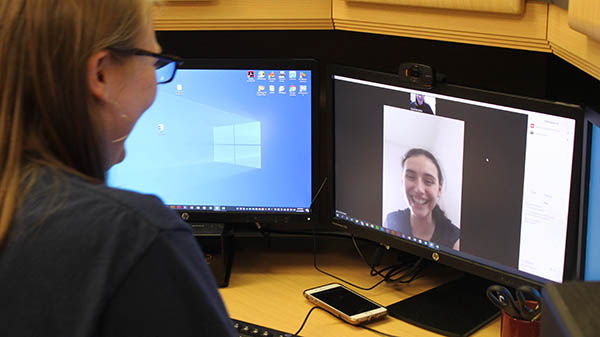Unlike most students at Southeastern College at Wake Forest in North Carolina, Daniel Ritchie takes notes in class by writing with his feet.
That’s also how he opens doors, brushes his teeth, plays video games and drives his car. The reason? Ritchie is one of only 250–300 people in the United States born without both arms.
Ritchie’s parents, Harry and Emily Ritchie, never had any idea their son would be born without arms, despite several ultrasound tests during the pregnancy.
“It was a complete surprise to the doctor and everyone else in the room,” Emily Ritchie said. “When he was born, there was a quiet hush over the operating room. But the presence of God was so powerful in that room. Even then, I knew he was going to do something special with his life.”
It seems Emily Ritchie was right.
Far from allowing his disability to slow him down, Ritchie graduated May 26 from Southeastern with a double major in biblical studies and the history of ideas and a 3.3 GPA — not bad for a guy who has to take notes with his feet.
Called into the ministry at age 16, he plans to devote his life to working with youth, especially those struggling to fit in. After all, he remembers what that feels like.
“I always wanted to fit in and be able to be like everybody else,” Ritchie said. “So I figured, ‘Well, I guess I better learn how to do some of these things.’”
“I learned how to adapt pretty quickly using my feet,” Ritchie said. “It was kind of natural for me that I just knew that I needed to use my feet for everything, and so I did. It was kind of difficult at first. I guess the toes weren’t naturally meant to do certain things, and you don’t really have an opposable thumb. I just adapted the best I could and did most things that every other kid did.”
Emily Ritchie said her son showed determination in everything he did from day one.
“He was very, very determined, and we never allowed him to say, ‘I can’t.’”
The traditionally turbulent middle school years were especially difficult for Ritchie, who battled with depression because he had difficulty making friends. Since he was not a Christian at the time, he had trouble coming to grips with the way God had chosen to make him.
“I didn’t have a lot of friends,” he said. “I wasn’t really outgoing at all. It was really difficult for me just trying to deal with that.”
However, things changed at age 15 when Ritchie trusted Jesus Christ as his Lord and Savior.
“After I got saved, God really started working in me,” he said. “I mean, it was a slow process gaining that confidence, but He really, really just did a work in me for the next few years. I slowly developed my confidence in Him more than anything.”
Now Ritchie plans to minister to other kids feeling the same way he felt. “I really have a heart for kids that feel like they’re outcasts and kids that just don’t feel like they have a place anywhere,” he said, “because I know what that’s like. I just know that above all else, I love youth and I don’t see it as a stepping-stone ministry but as a fulltime ministry for the rest of my life.”
Ritchie explained his strategy for magnifying God through his disability.
“I really talk about how in my mind as a kid I used to be uncomfortable with this, knowing that I was different,” he said. “That really used to bother me. Then I got saved when I was 15 and I really started growing in my faith. One of the first things I really started to learn and started to understand was that I was a special creation in the hands of an intelligent Maker.”
Ritchie shares how God formed him in his mother’s womb, a truth found in Psalm 139, where David said, “I was fearfully and wonderfully made.”
Ritchie said he tells others that God had a purpose in making him this way. He uses the story about the blind man and the disciples from John 9 as an example of God’s ways. Ritchie tells people that God can use everyone no matter how different they feel.
Ritchie said he enjoys sharing his testimony with fellow Christians as a means of encouraging them. “If God has gotten me this far in my life,” he tells people, “no matter what you have to face — whether it be a family member dying of cancer, or a sick child, or tough financial times or whatever — even though things might not go as we would have planned, God is still sovereign and God is still Lord over that.” (BP)






Share with others: